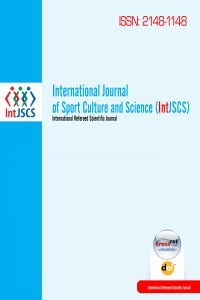The Educational Impact of Traditional Games: the Role of Zurkhaneh Sport in Educating Children
Traditional Games, Zurkhaneh, Persia (Ancient Iran) Culture,
___
- Ahmadvand MA (2002). Psychology of Games (educational science), Tehran, Payam-e-Noor University
- Hatfield B (1993). Sport Psychology: a Socio-psychological Approach, translated by Hajilu, M., Tehran, Research & Education Office, Physical Education Organization
- Ensafpour G (1974). History and Culture of Zurkhaneh and Zurkhaneh-Attending Social Groups, Tehran, Iranian Center of Anthropology
- Pirnia H (1994). Ancient Iran, Tehran, Donyaye Ketab
- Homayoun N (2003). Educational System and Institutions in Persia, Tehran, Humanities & Culture Studies Institution
- Hosseini SA (2005). Zurkhaneh and the Need for Rediscovering Cultural Identity and Sense of Social Belonging in Urban Communities, Tehran, National Olympic Academy Press
- Khani G (1994). The Impacts of Games, Physical Education, and Sport on the Human Body, Qom, Sina
- Rouhi Dehkordi M (2003). Globalization of Traditional Games, Sport & Value, vol. 169, Ministry of Education
- Farrokhi A (1972). The Connection between Game and Education: an Emphasis on Traditional Games in Iran, M.A. thesis in educational sciences, University of Tehran
- Corbin H (2006). L'Homme et Son Ange: Initiation et Chevalerie Spirituelle, Translated by Naraqi, E., 2nd ed., Tehran, Sokhan
- Karimi J (1985). A Glance at Worldwide History of Physical Education, Tehran, University Press
- Gudarzi M (2004). Evolution of Zurkhaneh in Iran, Hekmat, vol. 22, Physical Education Press, University of Tehran
- Proceedings of the 1st International Conference on Scientific, Historical, and Cultural Roots of Zurkhaneh (2004), Tehran, National Olympic Academy Press
- Mazlumi R (1987). A New Approach to History and Zurkhaneh Sport in Iran, Sport Quarterly, vol. 2, Physical Education Organization
- Malek Mohammadi G (1996). Rediscovering the Applications of Iranian Traditional Games and Sports, Tehran,
- ISSN: 2148-1148
- Başlangıç: 2013
- Yayıncı: Uluslararası Bilim Kültür ve Spor Derneği (UBİKS)
Haleem Ur REHMAN, Salahuddin KHAN, Alamgir KHAN
Gaurav DUREJA, Davinder SINGH, Gagandeep SINGH
Alamgir KHAN, Salahuddin KHAN, Manzoor KHAN
